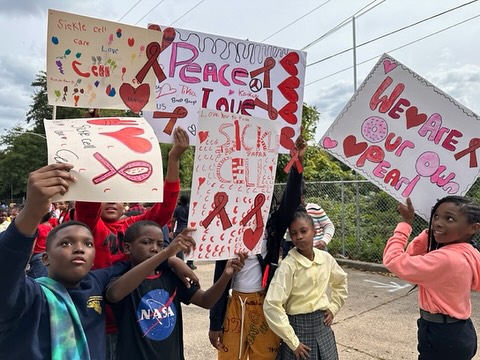The West Philadelphia Achievement Charter Elementary School (WPACES) recently held its annual Sickle Cell Walk, continuing the school’s tradition of raising awareness and demonstrating solidarity with those affected by the disease.
Sickle cell disease (SCD) is a genetic disorder that predominantly affects African Americans in the United States. The disease is also found among people with Hispanic, South Asian, Middle Eastern, and Mediterranean heritage. According to the Centers for Disease Control and Prevention (CDC), SCD affects approximately 100,000 Americans. Individuals with SCD have atypical hemoglobin molecules called hemoglobin S, which can distort red blood cells into a sickle, or crescent, shape. These misshapen cells can obstruct blood flow, leading to excruciating pain episodes, organ damage, and other complications. The lifespan of these sickle cells is significantly shorter than normal red blood cells, often resulting in anemia.
The Importance of Raising Awareness and Student Participation
Raising awareness about SCD is crucial for a myriad of reasons. First, early detection and diagnosis can notably enhance the quality of life and outcomes for those afflicted with SCD. Newborn screening is paramount because it ensures that infants diagnosed with the disease receive appropriate care from a young age.
In addition to these medical benefits, educational institutions, such as West Philadelphia Achievement Charter Elementary School (WPACES), play a pivotal role in enhancing community awareness. Every school year, students from Kindergarten to 5th grade participate in a sickle cell walk. Despite their young ages, their involvement not only educates them about the significance of community and empathy, but also amplifies the message of understanding and support for those living with SCD. Through such initiatives, awareness transcends generations, fostering a culture of empathy and promoting the importance of research, medical advancements, and early detection in the broader community.
“Instilling a profound sense of community and care in our young learners is not just an educational mission, but a moral imperative,” WPACES CEO Dr. Stacy Gill Phillips said. “The WPACES community believes that teaching our students the values of unity and their individual responsibility to advocate for such a cause has the power to illuminate paths of hope and support for those afflicted. Together, as one cohesive force, we can amplify awareness and nurture compassion.”


